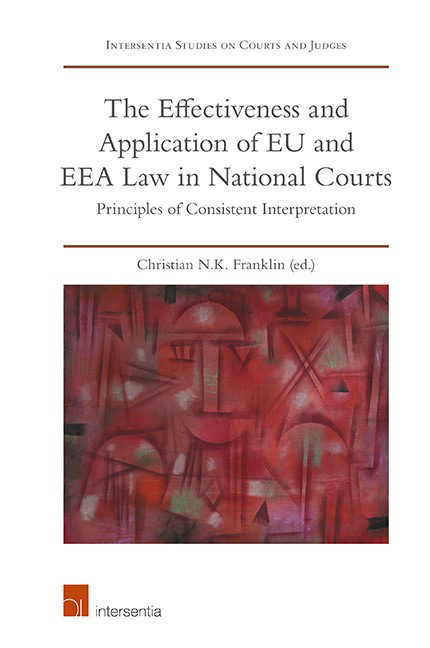 The Effectiveness and Application of EU and EEA Law in National Courts
The Effectiveness and Application of EU and EEA Law in National Courts United Kingdom
Published online by Cambridge University Press: 31 January 2019
Summary
INTRODUCTION
This study of the principle of consistent interpretation, more commonly referred to as the Marleasing principle in UK law, demonstrates the striking degree to which this method of statutory interpretation has been embedded in the practice of the UK national courts. Originating in the jurisprudence of the Court of Justice of the European Union (ECJ), and based on the principle of loyal co-operation set out in Art. 4(3) of the Treaty on European Union (TEU), the principle of consistent interpretation consists of a duty incumbent on all public authorities including national courts to interpret national law “ as far as is possible to do so “ in conformity with European Union (EU) law. The principle of consistent interpretation plays a fundamental role in securing the effective enforcement of individual rights derived from EU law before a national court. This study reveals that the principle has been invoked in a wide range of policy areas including tax, employment, intellectual property, data protection, and health and safety in the UK. More recently, the application of this method of statutory interpretation has been consciously “ assimilated “ by the judiciary with the application of s. 3 of the Human Rights Act 1998 (HRA) despite their separate theoretical and schematic underpinnings.
This chapter makes an important contribution to the literature in three respects. First, it explores the conceptual basis and scope of application of the principle of consistent interpretation by the UK courts in a systematic manner. There has been very limited exploration of its application before UK courts by either EU or public law scholars in more recent years, and a notable absence of detailed discussion of its symbiotic relationship with s. 3 HRA. The chapter identifies three different phases in the approach of the UK judiciary, and considers (briefly) the implications of the UK ‘ s withdrawal from the EU, and predicts the emergence of a fourth phase.
- Type
- Chapter
- Information
- The Effectiveness and Application of EU and EEA Law in National CourtsPrinciples of Consistent Interpretation, pp. 213 - 256Publisher: IntersentiaPrint publication year: 2018


